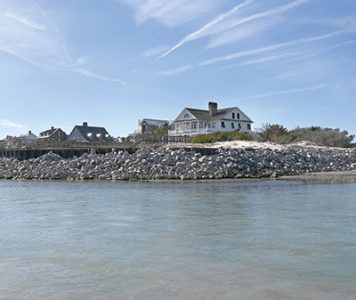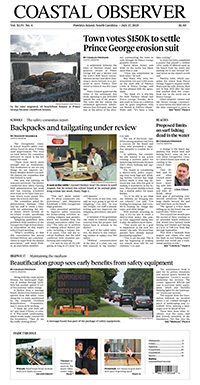Pawleys Island
Ruling lets beach suits move ahead, but with limits

A suit over the Pawleys Island beach renourishment project can continue, but a Circuit Court judge dismissed four claims in suits brought by neighboring property owners, including one that would have allowed them to seek triple damages.
In a ruling last month, Judge Paul Burch denied a motion from the state Department of Parks, Recreation and tourism to dismiss the three suits alleging that erosion at Prince George was caused by the placement of sand on Pawleys Island over the winter of 2019-20.
The agency funded a portion of the $14.8 million project, which was designed by Coastal Science and Engineering, permitted by the state Department of Health and Environmental Control and carried out by Marinex Construction. Property owners at Prince George have sued all four entities seeking to have their beachfront repaired and to have Pawleys Inlet at the south end of the island restored to its location before the renourishment.
Bud and Melesa Watts, who own the northernmost beachfront lots at Prince George, filed suit last July after seeing the inlet migrate south in front of their property. Other property owners and the Prince George Community Association filed similar suits.
At a hearing in February, PRT’s attorney Walker Humphrey argued that the plaintiffs had failed to exhaust their administrative remedies in challenging the DHEC permit. In fact, “they never sought any review,” he said.
State law provides for permit decisions made by agency staff to be appealed to the DHEC board and then to the Administrative Law Court.
“This argument fails for multiple reasons,” Burch said in his ruling.
The suits, which have since been consolidated, don’t challenge the decision to issue the permit, he noted.
“The question here is not whether DHEC should have issued the renourisment permit, but whether the Watts were damaged by the project and Defendants’ failure to take steps to prevent or mitigate the impacts on Prince George,” the judge said.
As a result, PRT “seeks dismissal based on facts that do not appear in the Complaint, which the Court may not consider,” the ruling states.
In addition, the judge determined that the request for an injunction requiring restoration of the beach and inlet was proper.
PRT argued that an injunction would force the agency to exceed its statutory authority. Humphreys argued in February that the funding for the project had been authorized by the legislature through a budget proviso.
Burch disagreed, saying the court could require PRT to pay to complete the project the way the Prince George property owners say it should have been done in the first place. That would not require the agency “to do anything that the legislature has prohibited it from doing,” he said.
The judge also found that the Prince George owners had met the standard for claiming negligence.
Burch dismissed claims that the renourishment caused a taking or inverse condemnation. Those require a showing of an “affirmative act,” and he said there is no allegation of “any facts that could rise to a reasonable inference that SCPRT caused the accelerated erosion.”
He dismissed claims for trespass for the same reason.
Claims for nuisance, which would have made PRT liable for damages were dismissed because they are not allowed under the state Tort Claims Act.
And since there were not sufficient facts alleged to show that PRT funding of the renourishment was “trade or commerce,” the claims for violation of the state Unfair Trade Practices Act were dismissed. Those would have tripled the amount of damages.
Since the renourishment was permitted by DHEC “any act taken pursuant to that permit was directly and specifically authorized by a regulatory agency and exempt for purposed of” the act, the judge said.




